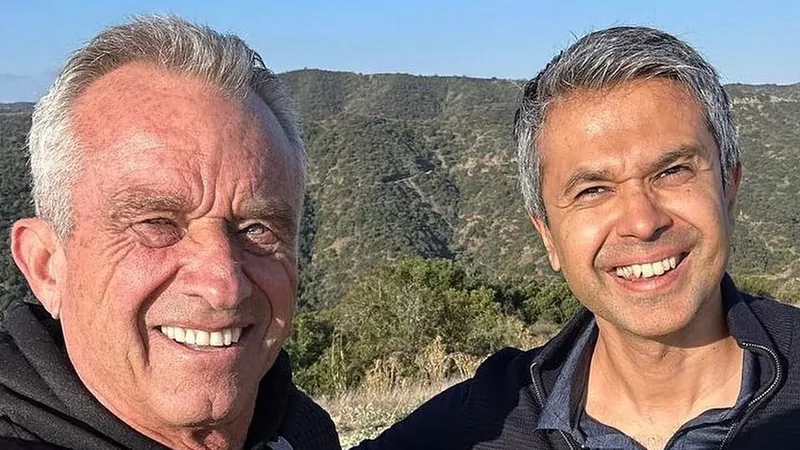
Trump's Health Overhaul: A Radical Plan to Combat America's Chronic Disease Epidemic
2024-11-14
Author: Ting
Trump's Health Overhaul: A Radical Plan to Combat America's Chronic Disease Epidemic
Donald Trump is poised to initiate a transformative approach to American health that targets unhealthy eating habits, an agenda that could represent one of the most significant shifts in dietary policy in recent history.
Despite Trump's well-known affinity for fast food, a key ally in his administration, Dr. Aseem Malhotra, a British cardiologist, is advocating for a major overhaul of the U.S. diet. Dr. Malhotra, who has appeared on various prominent platforms including Joe Rogan's podcast, is set to play a pivotal role in addressing the nation's alarming rates of chronic diseases, such as heart disease, which is currently the leading cause of death in the United States.
Dr. Malhotra, who previously faced pushback from the medical community for his controversial views on vaccines, believes that a significant proportion of chronic health issues stem from the rampant consumption of ultra-processed foods (UPFs). He is reportedly in discussions to serve as an advisor to the White House, focusing on obesity and cardiovascular health.
In a recent interview, Dr. Malhotra outlined his ambitious plan to treat junk food like tobacco, advocating for a "fat tax" on unhealthy snacks and an outright ban on these foods in schools and hospitals. "It's astonishing that 70% of the food provided in schools is highly processed. We must challenge the acceptability of such foods in health-conscious environments," he stated.
Drawing parallels with successful public health initiatives, he cited the sugar tax implemented in the UK, which led to a marked decrease in added sugar consumption and prompted manufacturers to reformulate their products. "If we can address the affordability of unhealthy foods through taxation, we can not only decrease consumption but also push the food industry towards healthier options," he explained.
Moreover, Dr. Malhotra advocates for implementing warning labels on junk food, similar to tobacco packaging, to better inform consumers about the potential health risks associated with these products. He envisions a future where advertisements for ultra-processed foods are banned altogether, reflecting a more health-conscious society.
The urgency of tackling America’s diet has never been clearer; about 680,000 American lives were lost to heart disease last year alone, surpassing the mortality rate from cancer. Dr. Malhotra argues that if he and the Trump administration can decouple the American diet from ultra-processed foods—which currently account for 60% of daily caloric intake—the nation could witness a rapid decline in health-related issues. "Just like we did with smoking, a shift in perception and policy can lead to significant change," he claimed.
Despite his radical stance on food policy, there remain questions about whether Trump will fully embrace Dr. Malhotra’s bold initiatives, considering the president-elect's own dietary preferences, which include fast food staples.
Additionally, Dr. Malhotra’s calls for a pause in the rollout of COVID-19 vaccines due to concerns over their side effects have raised eyebrows among public health experts. Although he previously endorsed the vaccines for high-risk populations, he has since shifted his position, linking their use to a troubling rise in cardiac issues among young people, a claim that has sparked considerable debate within the scientific community.
Amidst this backdrop, the Trump administration may find itself at a crossroads, needing to navigate complex public health policies while addressing concerns regarding vaccine skepticism and the influence of dietary habits on overall health.
As Trump prepares to take office once again, the impending healthcare policies could reshape America's approach to nutrition and disease prevention, prompting a much-needed national conversation on the future of food and health in the U.S.


 Brasil (PT)
Brasil (PT)
 Canada (EN)
Canada (EN)
 Chile (ES)
Chile (ES)
 España (ES)
España (ES)
 France (FR)
France (FR)
 Hong Kong (EN)
Hong Kong (EN)
 Italia (IT)
Italia (IT)
 日本 (JA)
日本 (JA)
 Magyarország (HU)
Magyarország (HU)
 Norge (NO)
Norge (NO)
 Polska (PL)
Polska (PL)
 Schweiz (DE)
Schweiz (DE)
 Singapore (EN)
Singapore (EN)
 Sverige (SV)
Sverige (SV)
 Suomi (FI)
Suomi (FI)
 Türkiye (TR)
Türkiye (TR)